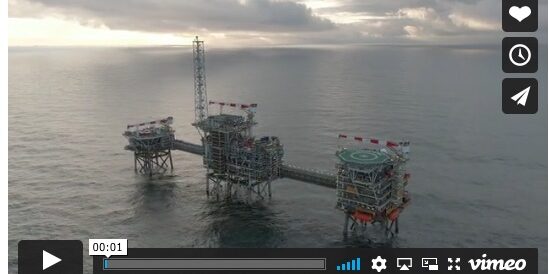Adam Bannister – FlyLogix, a specialist in long-range drone flights to offshore installations, says it has conducted the farthest, beyond-line-of-sight civilian drone flight ever recorded in the UK.
On 17 July, a Condor Drone took off from Blackpool Airport and managed an 88km round trip to an inspection of an unmanned platform in Morecambe Bay on behalf of oil and gas operator Centrica. The drone relayed detailed infrared imagery from the flight.
FlyLogix, a start-up based in Chichester, also collaborated with the Civil Aviation Authority (CAA), Blackpool Airport and other air space users before the trial.
The use of drones in remote or dangerous locations negates the costs and risks associated with deploying human personnel into such scenarios instead.
“This is a major milestone for FlyLogix as we showcase the significant benefits of our long range offshore drone service, and ultimately demonstrate the future of offshore inspection and logistics,” said FlyLogix Chairman Charles Tavner.
“We are grateful for the support of the CAA, Centrica, Blackpool Airport and other air space users, to ensure the success of this record service. FlyLogix is uniquely placed to deliver this service.
“We have clearly shown the track record, the technology and industry knowledge to complete these operations. We are extremely excited about rolling this service out more widely, and the future prospects of FlyLogix as the trusted service provider.”
Top priority
Despite rapid advances in drone technology, constraints on flight duration limit the range and scope of applications. Commercial drones can typically fly continuously for only about 25 minutes.
Developing batteries that are lighter, higher capacity and less hazardous is a top priority for the industry.
There are also restrictions on beyond the line of sight operations, which are banned over populated areas in most developed countries. However, more latitude is given for offshore and other remote deployments.
The UK government has just announced plans to introduce mandatory registration of drones and safety awareness courses for pilots of drones weighing more than 250g.
A 2016 report from PriceWaterhouseCoopers projects that the security drone market will be worth $10.5bn (£8bn) by 2020, surpassed only by infrastructure, agriculture and transport.
Our recent Security Drones Report 2017 -(sponsored by Aviat Drones) revealed that 16% percent of respondents – mostly comprising security professionals, heads of security and other senior executives – say they already deploy the technology.
A total of 60% either already use drones or can foresee themselves doing so eventually, with only 16% indicating that they “probably won’t ever need drone technology for any security application”, the other 24% admitting that they don’t know enough about the technology to commit either way.





